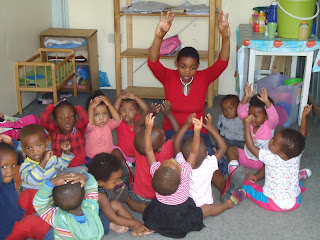15 August
Another warm winter’s day in Cape Town. Today I have Shelley in the
car with me, she is a very good ex colleague of mine, and we worked together at
a Montessori pre-school some three years ago. I had always remembered she was
interested in outreach and here she is kindly volunteering her time to help with
the Ladder to Literacy project.
I fill Shelley in about last week’s session as we are making our way
to the Townships. I tell her about the disturbing discovery that only two out
of the fifteen teachers read to the children in their care and they do not have
any books. I also tell her that upon sharing this information with my
colleagues at our ELF offices their response was “Not having books is no excuse
not to read to children.” You could make up stories, use magazines, newspaper,
and even draw. As I think about it, they are right; we live in a world where
there is literacy all around us. The teachers need the right encouragement and
understanding of the importance of this literacy in the child’s world.
I tell Shelley about the material making session, how the ladies
struggled to rule straight lines, cut straight and paste straight. Shelley
knows the importance of presenting beautiful attractive materials to the children.
She offers to help in this area, much to my relief and gratitude. Patience is a
virtue. We arrive; we unload the car and set up the materials. The ladies
arrive and we start our session with a recap of last week. Here the ladies role
play and practice the activities covered last week.
This week’s session focused on activities to prepare the child for
handwriting, from working with sandpaper letters, how to hold a pencil, to
making patterns using a pencil to name just a few. All of the activities are
practical and most can be easily made. The teachers happily agree on this. Some
of them share that they have black boards and paper and scissors but it never
occurred to them to demonstrate to children how to cut lines or make patterns
with a pencil or chalk board. They very easily understood the importance of
helping the child develop good hand muscle and hand eye coordination. They were very quick to link the activities
to the practical life activities covered last year. It is heart warming to see
such progress from the teachers.
As the demonstrations and practice continue, Shelley is busy in the
background, cutting card with the guillotine and laminating the materials
already done by the teachers. This was a huge time saver and the teachers
looked forward to finishing off their materials to take to the children. I know
our Ladder to Literacy project has just began, the teachers are slowly piecing
all the information together and I’m thrilled but at the same time I am concerned
about introducing Xhosa literacy. There are such limited resources for
Xhosa.....guess it’s time to put on our creative hats!



















